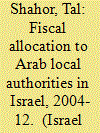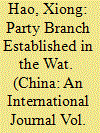|
|
|
Sort Order |
|
|
|
Items / Page
|
|
|
|
|
|
|
| Srl | Item |
| 1 |
ID:
174576


|
|
|
|
|
| Summary/Abstract |
This article compares the amount of land designated for various uses in the Jewish and Arab municipalities in Israel between the years 2003–13. It is generally accepted that the Arab-Jewish conflict in Israel is heavily based on land ownership. This conflict still has implications for the policies and actions of the State of Israel on the one hand, and the attitudes and behaviours of the Arab population on the other. Two main conclusions emerge from this article. The first is that in 2013, the area per capita used for residential living in Arab localities was larger, presumably because of the lack of high-rise buildings. The second conclusion is that the areas designated for economic and public purposes in the Arab sector are much smaller. The Israeli government should therefore allocate additional government land to the Arab local authorities.
|
|
|
|
|
|
|
|
|
|
|
|
|
|
|
|
| 2 |
ID:
171395


|
|
|
|
|
| Summary/Abstract |
Energy Efficient Scotland (EES) is the Scottish Government's flagship programme for the national-scale retrofitting of buildings over the next 15–20 years. This is a critical component of Scotland's commitment to net zero greenhouse gas emissions by 2045, that will also help to reduce fuel poverty and improve local economies. The success of EES is reliant on partnerships between local authorities, arms-length external organisations, charities, and social enterprises. However, little is known about how these organisations collaborate for the delivery of building retrofit. This paper analyses interview data from local authorities and these delivery partners, conceptualising them as part of linked ecologies, or interconnected networks of professional groups. EES is identified as a hinge that holds distinct meanings for different parties; it supports learning between local authorities and delivery partners, but does not guarantee the alignment of priorities. The concept of avatars, or individuals and skills that travel between organisations, reveals the search for relevant internal knowledge amongst local authority officers, whilst external delivery partners amass expertise for retrofitting. To ensure successful national-scale building retrofit, policy makers will need to develop shared databases, and clear guidance for the allocation and distribution of resources and responsibilities between local authorities and delivery partners.
|
|
|
|
|
|
|
|
|
|
|
|
|
|
|
|
| 3 |
ID:
133746


|
|
|
|
|
| Publication |
2014.
|
| Summary/Abstract |
This article measures whether the Israeli government adopted a policy of affirmative action towards the Arab minority during the period 2004-12 within the parameters of local government. Unlike previous research, it focuses only on permanent fiscal allotments and ignores one-off payments. The general trend evident from the findings of this article is one of an increase in fiscal allotments to Arab sector local authorities
|
|
|
|
|
|
|
|
|
|
|
|
|
|
|
|
| 4 |
ID:
126566


|
|
|
|
|
| Publication |
2013.
|
| Summary/Abstract |
This paper presents results from modelling work investigating the effects of social networks on the adoption of energy technologies in the domestic sector. This work concerns ideas on social network interventions which have been successfully applied in other domains but which have seldom been applied to energy policy questions. We employ a dynamical multi-parameter network model where households are represented as nodes on a network for which the uptake of technologies is influenced by both personal benefit and social influences. This is applied to demonstrate the usefulness of this type of model in assessing the likely success of different roll-out strategies that a local authority could pursue in promoting the uptake of domestic energy technologies. Local authorities can play a key role in the retrofit of energy-efficiency and low-carbon energy-generation technologies in order to realise carbon reductions and alleviate fuel poverty. Scenarios are modelled for different local authority interventions that target network interactions and uptake threshold effects, and the results provide insights for policy. The potential for the use of this type of modelling in understanding the adoption of energy innovations in the domestic sector and designing local-level interventions is demonstrated.
|
|
|
|
|
|
|
|
|
|
|
|
|
|
|
|
| 5 |
ID:
190387


|
|
|
|
|
| Summary/Abstract |
The Communist Party of China enhanced its local presence by establishing a branch in the Theravada Buddhist wat in Dehong. Such direct political engagement in a religious venue, however, does not lead to grievances from the locals. This article finds that if the purely ideological differences can be well managed at the local level, the religion and the Party can cooperate with each other and maintain a harmonious relationship. This article reflects on the state–religion antagonism paradigm and argues that an alternative paradigm—an interests-based paradigm—should be prioritised when studying relations between the state and religion in China.
|
|
|
|
|
|
|
|
|
|
|
|
|
|
|
|
| 6 |
ID:
156260


|
|
|
|
|
| Summary/Abstract |
An emerging body of literature views authoritarian elections as an institutional tool utilized by ruling elites to sustain power. However, like a double-edged sword, elections may also destabilize authoritarian regimes and trigger the process of democratization. How do authoritarian rulers make sure elections serve their purposes? What electioneering mechanisms do they employ to engineer electoral victory? Do electoral institutions matter in single-party regimes? Based on intensive fieldwork, this article will lay out for the first time a menu of controlling strategies and tactics deployed in China’s direct congressional elections. Drawing on these mechanics allows local electoral authorities to play by the rules as they manufacture electoral certainties for the Communist Party. Furthermore, the political logic of ‘socialist democracy’ and its operationalization in local congressional elections will also be discussed. A closer look at the micro-level dynamics of authoritarian elections may help develop our understanding of why there has been a mixed record of ‘democratization by elections’.
|
|
|
|
|
|
|
|
|
|
|
|
|
|
|
|
| 7 |
ID:
118688


|
|
|
|
|
| Publication |
2013.
|
| Summary/Abstract |
This article is based on a survey conducted over two years in Kunming and its vicinity, as well as in the rural areas of Yunnan Province. It considers the relations between administrators (officials) and the administered (families) in the process of adoption procedures. After going over the regular, albeit little noticed, practices of adoption in China, the text analyses the interactions and negotiations that take place, case by case, as families turn towards local authorities in order to legalise the presence of a child they have acquired and taken charge of. The main focus is on the multiple and also contradictory legislative frameworks having a bearing on institutional procedures that, in view of their internal contradictions, widen the margin of manoeuvrability for local officials as well as adoptive families. The two sides thus come up with non-legal norms concerning what is best suited to such situations.
|
|
|
|
|
|
|
|
|
|
|
|
|
|
|
|
| 8 |
ID:
178169


|
|
|
|
|
| Summary/Abstract |
The period of 1930s in Soviet history is one from the most discussed in the contemporary Russian historiography. Therefore, Russian and foreign specialists conduct a large number of studies on this topic, and process archive data in order to search for new information. Their attitude towards repression is not unambiguous. Despite the large number of publications on this topic, there are still some areas that are unrobed by researchers. One of them is the relationship of NKVD and the Korean diaspora in the Soviet Far East. As is known, NKVD deported Soviet Koreans from the Far East to Central Asia in 1937. However, this question is complicated and accompanied struggles in regional NKVD. The aim of our work is to consider and analyze the relationship of the local NKVD and party organization to the Korean diaspora in the southern part of the Soviet Far East before ethnic deportation.
|
|
|
|
|
|
|
|
|
|
|
|
|
|
|
|
|
|
|
|
|